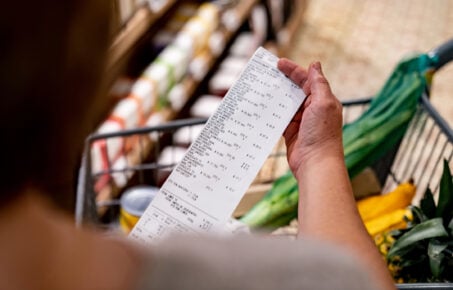The countdown to 2025 isn’t just about New Year’s resolutions. These five financial questions can help you wrap up the year with smart money moves to pad your wallet.
1. Have I maximized the perks of tax-advantaged accounts?
Tax-Free Savings Account (TFSA)
Want to build wealth? A TFSA can be a powerful tool, with a respectable $7,000 contribution limit for 2024. While this account’s December 31st deadline isn’t necessarily make or break (unused contribution room carries forward), generally speaking, the longer your money has to grow, the bigger your potential return.
And speaking of returns — nearly half (47%) of TFSA holders keep their savings in cash rather than investing them, according to BMO’s 2024 Annual Investment Survey [1]. While a TFSA can function as a savings account, you may be leaving extra money on the table by neglecting to invest your TFSA funds.
First Home Savings Account (FHSA)
Dreaming of buying your first home? For those squirrelling away a down payment fund in hopes of hanging a wreath on their own front door, December 31 is your deadline to make tax-deductible FHSA contributions for the 2024 tax year. Contributions up to $8,000 are tax-deductible, and while unused room carries forward, depositing funds before year-end ensures you can maximize your deduction of your 2024 taxable income.
Registered Education Savings Plan (RESP)
Want to invest in the gift of a child’s education? Contributing at least $2,500 by year-end to an RESP by December 31 unlocks up to $500 in free government grants per child for 2024 through the Canada Education Savings Grant (CESG). While there’s no annual limit for RESP contributions, late contributions could mean missing out on this year’s grant, as the government only matches up to $1,000 in CESG annually, even when catching up on previous years.
Registered Retirement Savings Plan (RRSP)
Want to plan for your future? While other accounts face tight December deadlines, the RRSP contribution deadline for the 2024 tax year is March 3, 2025. While this post-holiday grace period provides breathing room, don’t lose sight of this deadline, even if it might seem distant during the hubbub of holiday festivities.
2. Can I optimize my taxes now to save money next spring?
‘Tis the season to trim the tree — and your 2024 tax bill. Consider how the gift of charitable giving this holiday season can help reduce your tax bill come spring.
The federal government offers a two-tier tax credit on donations to charity:
- 15% on the first $200 donated.
- 29% on amounts above $200.
Plus, potential provincial credits can boost your savings further.
Just don’t wait too long to spread the seasonal cheer. December 31, 2024, is the deadline to claim these credits on your 2024 tax return. While unused donation amounts can be carried forward for up to five years, acting now means immediate tax benefits.
🤓 Nerdy Tip: If your investment portfolio had a rough year, tax-loss harvesting — selling investments at a loss to offset capital gains — can also reduce taxes owed. Talk to a professional about how to consider this strategy before year-end.
3. What can I learn from my spending habits?
Your spending habits tell a story, and with the rising cost of living, that story may be more revealing than ever. From January 2021 to August 2024, headline inflation in Canada rose by 17.1%, as measured by the Consumer Price Index (CPI) — a rise equal to the collective CPI increase during the ten years prior to 2021 [2]. To put that in perspective, Canada experienced a decade’s worth of inflation in just three and a half years.
Since it’s more expensive than ever before to live in Canada, we need to pay special attention to where our money goes. Harsh winter weather might offer the perfect excuse to stay nested indoors, curled up with your digital wallet and bank statements to trace your 2024 spending journey. The insights you glean can help craft practical spending goals for 2025.
Ready to take action on your financial review?
- Use budgeting apps like PocketSmith and Honeydue to help track your (and your family’s) spending.
- Conduct a subscription audit to help you pare back unnecessary ongoing fees for services you don’t use.
- Reevaluate your credit card to ensure its rates, fees and rewards continue to align with your spending habits and financial goals.
4. Do I qualify for the financial relief rebate?
A $250 windfall could be heading your way next spring. The Department of Finance Canada has announced the new Working Canadians Rebate, a tax-free payment aimed at providing financial relief to approximately 18.7 million Canadians in early spring 2025. You might qualify if you:
- Worked in 2023 and earned up to $150,000 in net income.
- File your 2023 tax return by December 31, 2024.
- Are a resident of Canada on March 21, 2025.
The Canada Revenue Agency (CRA) plans to automatically deliver the rebate via direct deposit or cheque, so no special application is needed. While it may arrive after the holidays, this springtime rebate could give your finances a helpful boost if used strategically. Before you plan a shopping spree with this cash, consider:
- Paying down high-interest debt.
- Boosting your emergency fund.
- Contributing to a tax-advantaged account, like an RRSP or TFSA.
5. How can I take advantage of the temporary GST relief?
Holiday shopping might be a little easier on your wallet this year. The federal government has proposed temporarily lifting the Goods and Services Tax (GST) and Harmonized Sales Tax (HST) on essential items from December 14, 2024, to February 15, 2025.
What’s covered? Everything from groceries and restaurant meals to children’s clothing and gifts.
The potential savings could be significant, too, depending on your spending habits. For example, if you typically spend $1,500 monthly on qualifying items, you could save $75 in GST on those purchases alone. In provinces that also charge HST, like Ontario, the savings could be even higher.
Consider treating these tax savings like “found money” and direct them toward your financial goals. Every penny counts, and even small amounts can help you fortify your finances, whether it be to tackle debt, build your emergency fund or save for retirement.
Sources
-
Bank of Montreal, “BMO Annual Investment Survey: TFSA Usage Dips as Canadians Contend with Economic Concerns, Rising Costs and Managing Debt,” accessed December 10, 2024.
-
Statistics Canada, “Recent developments in the Canadian economy: Fall 2024,” accessed December 10, 2024.
DIG EVEN DEEPER

Ho-Ho-How Much? Unwrapping 2024 Holiday Meal Costs — And How to Save
Canadians may need to brace for higher grocery bills this holiday season. Discover how much prices have changed and get tips to keep your holiday meal within budget.

4 Financial Trends That Could Shape 2025: Debt, Housing and More
With inflation expected to stabilize, the nation’s economic outlook is promising, but Canadians still face crucial decisions about managing debt.

TFSA Contribution Limit and Withdrawal Rules for 2025
TFSA contribution limit for 2025 is $7,000 — an annual ceiling for how much you can contribute to a tax-free savings account. However, over-contributing, can cost you a tax penalty.

Everything You Need To Know About Canada’s 2025 Housing Market
Learn how new mortgage rules, lower interest rates and slashed immigration targets will affect home buyers.

